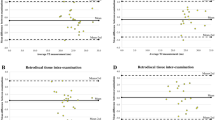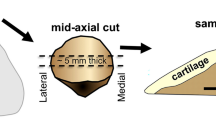Abstract
Purpose
To quantify MR properties of discs from cadaveric human temporomandibular joints (TMJ) using quantitative conventional and ultrashort time-to-echo magnetic resonance imaging (UTE MRI) techniques and to corroborate regional variation in the MR properties with that of biomechanical indentation stiffness.
Methods
This study was exempt from the institutional review board approval. Cadaveric (four donors, two females, 74 ± 10.7 years) TMJs were sliced (n = 14 slices total) sagittally and imaged using quantitative techniques of conventional spin echo T2 (SE T2), UTE T2*, and UTE T1rho. The discs were then subjected to biomechanical indentation testing, which is performed by compressing the tissue with the blunt end of a small solid cylinder. Regional variations in MR and indentation stiffness were correlated. TMJ of a healthy volunteer was also imaged to show in vivo feasibility.
Results
Using the ME SE T2 and the UTE T1rho techniques, a significant (each p < 0.0001) inverse relation between MR and indentation stiffness properties was observed for the data in the lower range of stiffness. However, the strength of correlation was significantly higher (p < 0.05) for UTE T1rho (R2 = 0.42) than SE T2 (R2 = 0.19) or UTE T2* (R2 = 0.02, p = 0.1) techniques.
Conclusion
The UTE T1rho technique, applicable in vivo, facilitated quantitative evaluation of TMJ discs and showed a high sensitivity to biomechanical softening of the TMJ discs. With additional work, the technique may become a useful surrogate measure for loss of biomechanical integrity of TMJ discs reflecting degeneration.






Similar content being viewed by others
References
Alomar X, Medrano J, Cabratosa J, Clavero JA, Lorente M, Serra I, et al. Anatomy of the temporomandibular joint. Semin Ultrasound CT MR. 2007;28(3):170–83.
Detamore MS, Orfanos JG, Almarza AJ, French MM, Wong ME, Athanasiou KA. Quantitative analysis and comparative regional investigation of the extracellular matrix of the porcine temporomandibular joint disc. Matrix Biol. 2005;24(1):45–57.
Nakano T, Scott PG. Changes in the chemical composition of the bovine temporomandibular joint disc with age. Arch Oral Biol. 1996;41(8–9):845–53.
Nakano T, Sim JS. Glycosaminoglycans from the rooster comb and wattle. Poult Sci. 1989;68(9):1303–6.
Sindelar BJ, Evanko SP, Alonzo T, Herring SW, Wight T. Effects of intraoral splint wear on proteoglycans in the temporomandibular joint disc. Arch Biochem Biophys. 2000;379(1):64–70.
Almarza AJ, Bean AC, Baggett LS, Athanasiou KA. Biochemical analysis of the porcine temporomandibular joint disc. Br J Oral Maxillofac Surg. 2006;44(2):124–8.
Beek M, Aarnts MP, Koolstra JH, Feilzer AJ, van Eijden TM. Dynamic properties of the human temporomandibular joint disc. J Dent Res. 2001;80(3):876–80.
Beek M, Koolstra JH, van Eijden TMGJ. Human temporomandibular joint disc cartilage as a poroelastic material. Clin Biomech (Bristol, Avon). 2003;18(1):69–76.
Chin LP, Aker FD, Zarrinnia K. The viscoelastic properties of the human temporomandibular joint disc. J Oral Maxillofac Surg. 1996;54(3):315–8.
Kang H, Bao G-J, Qi S-N. Biomechanical responses of human temporomandibular joint disc under tension and compression. Int J Oral Maxillofac Surg. 2006;35(9):817–21.
Kim K-W, Wong ME, Helfrick JF, Thomas JB, Athanasiou KA. Biomechanical tissue characterization of the superior joint space of the porcine temporomandibular joint. Ann Biomed Eng. 2003;31(8):924–30.
Tanaka E, van Eijden T. Biomechanical behavior of the temporomandibular joint disc. Crit Rev Oral Biol Med. 2003;14(2):138–50.
Tanaka E, Yamano E, Dalla-Bona DA, Watanabe M, Inubushi T, Shirakura M, et al. Dynamic compressive properties of the mandibular condylar cartilage. J Dent Res. 2006;85(6):571–5.
Lu XL, Mow VC, Guo XE. Proteoglycans and mechanical behavior of condylar cartilage. J Dent Res. 2009;88(3):244–8.
Bae WC, Temple MM, Amiel D, Coutts RD, Niederauer GG, Sah RL. Indentation testing of human cartilage: sensitivity to articular surface degeneration. Arthritis Rheum. 2003;48(12):3382–94.
Bae WC, Lewis CW, Levenston ME, Sah RL. Indentation testing of human articular cartilage: effects of probe tip geometry and indentation depth on intra-tissue strain. J Biomech. 2006;39(6):1039–47.
Stowell AW, Gatchel RJ, Wildenstein L. Cost-effectiveness of treatments for temporomandibular disorders: biopsychosocial intervention versus treatment as usual. J Am Dent Assoc. 2007;138(2):202–8.
Goncalves DA, Dal Fabbro AL, Campos JA, Bigal ME, Speciali JG. Symptoms of temporomandibular disorders in the population: an epidemiological study. J Orofac Pain. 24(3):270–78.
Ahmad M, Hollender L, Anderson Q, Kartha K, Ohrbach R, Truelove EL, et al. Research diagnostic criteria for temporomandibular disorders (RDC/TMD): development of image analysis criteria and examiner reliability for image analysis. Oral Surg Oral Med Oral Pathol Oral Radiol Endod. 2009;107(6):844–60.
Klasser GD, Greene CS. The changing field of temporomandibular disorders: what dentists need to know. J Can Dent Assoc. 2009;75(1):49–53.
Dimitroulis G. The prevalence of osteoarthrosis in cases of advanced internal derangement of the temporomandibular joint: a clinical, surgical and histological study. Int J Oral Maxillofac Surg. 2005;34(4):345–9.
Tominaga K, Hirashima S, Fukuda J. An experimental model of osteoarthrosis of the temporomandibular joint in monkeys. Br J Oral Maxillofac Surg. 2002;40(3):232–7.
Kopp S. Topographical distribution of sulphated glycosaminoglycans in human temporomandibular joint disks. A histochemical study of an autopsy material. J Oral Pathol. 1976;5(5):265–76.
Tanaka E, Shibaguchi T, Tanaka M, Tanne K. Viscoelastic properties of the human temporomandibular joint disc in patients with internal derangement. J Oral Maxillofac Surg. 2000;58(9):997–1002.
Ren YF, Westesson PL, Isberg A. Magnetic resonance imaging of the temporomandibular joint: value of pseudodynamic images. Oral Surg Oral Med Oral Pathol Oral Radiol Endod. 1996;81(1):110–23.
Cavalcanti MG, Lew D, Ishimaru T, Ruprecht A. MR imaging of the temporomandibular joint: a validation experiment in vitro. Acad Radiol. 1999;6(11):675–9.
Chirani RA, Jacq JJ, Meriot P, Roux C. Temporomandibular joint: a methodology of magnetic resonance imaging 3-D reconstruction. Oral Surg Oral Med Oral Pathol Oral Radiol Endod. 2004;97(6):756–61.
Stehling C, Vieth V, Bachmann R, Nassenstein I, Kugel H, Kooijman H, et al. High-resolution magnetic resonance imaging of the temporomandibular joint: image quality at 1.5 and 3.0 Tesla in volunteers. Investig Radiol. 2007;42(6):428–34.
Vilanova JC, Barcelo J, Puig J, Remollo S, Nicolau C, Bru C. Diagnostic imaging: magnetic resonance imaging, computed tomography, and ultrasound. Semin Ultrasound CT MR. 2007;28(3):184–91.
Robson MD, Gatehouse PD, Bydder M, Bydder GM. Magnetic resonance: an introduction to ultrashort TE (UTE) imaging. J Comput Assist Tomogr. 2003;27(6):825–46.
Robson MD, Bydder GM. Clinical ultrashort echo time imaging of bone and other connective tissues. NMR Biomed. 2006;19(7):765–80.
Du J, Carl M, Bydder M, Takahashi A, Chung CB, Bydder GM. Qualitative and quantitative ultrashort echo time (UTE) imaging of cortical bone. J Magn Reson. 2010;207(2):304–11.
Du J, Carl M, Diaz E, Takahashi A, Han E, Szeverenyi NM, et al. Ultrashort TE T1rho (UTE T1rho) imaging of the Achilles tendon and meniscus. Magn Reson Med. 2010;64(3):834–42.
Wheaton AJ, Dodge GR, Elliott DM, Nicoll SB, Reddy R. Quantification of cartilage biomechanical and biochemical properties via T1rho magnetic resonance imaging. Magn Reson Med. 2005;54(5):1087–93.
Regatte RR, Akella SV, Lonner JH, Kneeland JB, Reddy R. T1rho relaxation mapping in human osteoarthritis (OA) cartilage: comparison of T1rho with T2. J Magn Reson Imaging. 2006;23(4):547–53.
Zarins ZA, Bolbos RI, Pialat JB, Link TM, Li X, Souza RB, et al. Cartilage and meniscus assessment using T1rho and T2 measurements in healthy subjects and patients with osteoarthritis. Osteoarthr Cartil. 2010;18(11):1408–16.
Blumenkrantz G, Zuo J, Li X, Kornak J, Link TM, Majumdar S. In vivo 3.0-Tesla magnetic resonance T1rho and T2 relaxation mapping in subjects with intervertebral disc degeneration and clinical symptoms. Magn Reson Med. 2010;63(5):1193–200.
Yuya PA, Amborn EK, Beatty MW, Turner JA. Evaluating anisotropic properties in the porcine temporomandibular joint disc using nanoindentation. Ann Biomed Eng. 2010;38(7):2428–37.
Luder HU. Frequency and distribution of articular tissue features in adult human mandibular condyles: a semiquantitative light microscopic study. Anat Rec. 1997;248(1):18–28.
Bae WC, Law AW, Amiel D, Sah RL. Sensitivity of indentation testing to step-off edges and interface integrity in cartilage repair. Ann Biomed Eng. 2004;32:360–9.
Carlsson G, LeResche L. Epidemiology of temporomandibular disorders. In: Sessle B, Bryant P, Dionne R, editors. Temporomandibular disorders and related pain conditions. Seattle: IASP Press; 1995.
Clement C, Bravetti P, Plenat F, Foliguet B, Haddioui AE, Gaudy JF, et al. Quantitative analysis of the elastic fibres in the human temporomandibular articular disc and its attachments. Int J Oral Maxillofac Surg. 2006;35(12):1120–6.
Foucart JM, Pajoni D, Carpentier P, Pharaboz C. MRI study of temporomandibular joint disk behavior in chilren with hyperpropulsion appliances. Orthod Fr. 1998;69(1):79–91.
Gold DM. Direct measurement of prepulse suppression by use of a plasma shutter. Opt Lett. 1994;19(23):2006–8.
Rao VM, Bacelar MT. MR imaging of the temporomandibular joint. Neuroimaging Clin N Am. 2004;14(4):761–75.
Landesberg R, Takeuchi E, Puzas JE. Cellular, biochemical and molecular characterization of the bovine temporomandibular joint disc. Arch Oral Biol. 1996;41(8–9):761–7.
Duyn J, van Gelderen P, Li T, de Zwart J, Koretsky A, Fukunaga M. High-field MRI of brain cortical substructure based on signal phase. Proc Natl Acad Sci U S A. 2007;104(28):11796–801.
Bae W, Dwek J, Znamirowski R, Statum S, Hermida J, D’Lima D, et al. Ultrashort TE MRI of the Osteochondral junction of the knee at 3T: identification of anatomic structures contributing to signal intensity. Proceedings 17th Scientific Meeting, International Society for Magnetic Resonance in Medicine; 2009 April; Honolulu; 2009. p. 78.
Helms CA, Kaban LB, McNeill C, Dodson T. Temporomandibular joint: morphology and signal intensity characteristics of the disk at MR imaging. Radiology. 1989;172(3):817–20.
Berkovitz BK, Pacy J. Age changes in the cells of the intra-articular disc of the temporomandibular joints of rats and marmosets. Arch Oral Biol. 2000;45(11):987–95.
Hayakawa Y, Kober C, Otonari-Yamamoto M, Otonari T, Wakoh M, Sano T. An approach for three-dimensional visualization using high-resolution MRI of the temporomandibular joint. Dentomaxillofac Radiol. 2007;36(6):341–7.
Wang EY, Mulholland TP, Pramanik BK, Nusbaum AO, Babb J, Pavone AG, et al. Dynamic sagittal half-Fourier acquired single-shot turbo spin-echo MR imaging of the temporomandibular joint: initial experience and comparison with sagittal oblique proton-attenuation images. AJNR Am J Neuroradiol. 2007;28(6):1126–32.
Lyyra T, Kiviranta I, Vaatainen U, Helminen HJ, Jurvelin JS. In vivo characterization of indentation stiffness of articular cartilage in the normal human knee. J Biomed Mater Res. 1999;48(4):482–7.
Martin I, Obradovic B, Freed LE, Vunjak-Novakovic G. Method for quantitative analysis of glycosaminoglycan distribution in cultured natural and engineered cartilage. Ann Biomed Eng. 1999;27(5):656–62.
Milam SB, Klebe RJ, Triplett RG, Herbert D. Characterization of the extracellular matrix of the primate temporomandibular joint. J Oral Maxillofac Surg. 1991;49(4):381–91.
Sah RL, Chen AC, Grodzinsky AJ, Trippel SB. Differential effects of bFGF and IGF-I on matrix metabolism in calf and adult bovine cartilage explants. Arch Biochem Biophys. 1994;308:137–47.
Peterson L, Brittberg M, Kiviranta I, Akerlund EL, Lindahl A. Autologous chondrocyte transplantation. Biomechanics and long-term durability. Am J Sports Med. 2002;30:2–12.
Duvvuri U, Reddy R, Patel SD, Kaufman JH, Kneeland JB, Leigh JS. T1rho-relaxation in articular cartilage: effects of enzymatic degradation. Magn Reson Med. 1997;38(6):863–7.
Samosky JT, Burstein D, Eric Grimson W, Howe R, Martin S, Gray ML. Spatially-localized correlation of dGEMRIC-measured GAG distribution and mechanical stiffness in the human tibial plateau. J Orthop Res. 2005;23(1):93–101.
Yokoo T, Bae WC, Hamilton G, Karimi A, Borgstede JP, Bowen BC, et al. A quantitative approach to sequence and image weighting. J Comput Assist Tomogr. 2010;34(3):317–31.
Acknowledgments
This article was made possible in part by a Veterans Affairs Merit grant (project ID 1161961) and the National Institute of Dental and Craniofacial Research of the National Institutes of Health in support of Dr. Christine B. Chung (grant no. 5R01 DE022068), as well as the National Institute of Arthritis and Musculoskeletal and Skin Diseases of the National Institutes of Health in support of Dr. Won C. Bae (grant no. K01AR059764). The contents of this article are solely the responsibility of the authors and do not necessarily represent the official views of the National Institutes of Health or Veterans Affairs.
Conflict of interest
The authors declare that they have no conflict of interest.
Funding sources
VA, NIH
Author information
Authors and Affiliations
Corresponding author
Rights and permissions
About this article
Cite this article
Bae, W.C., Biswas, R., Statum, S. et al. Sensitivity of quantitative UTE MRI to the biomechanical property of the temporomandibular joint disc. Skeletal Radiol 43, 1217–1223 (2014). https://doi.org/10.1007/s00256-014-1901-y
Received:
Revised:
Accepted:
Published:
Issue Date:
DOI: https://doi.org/10.1007/s00256-014-1901-y




